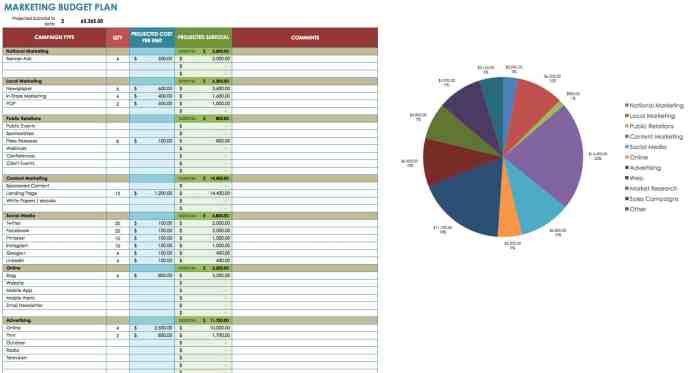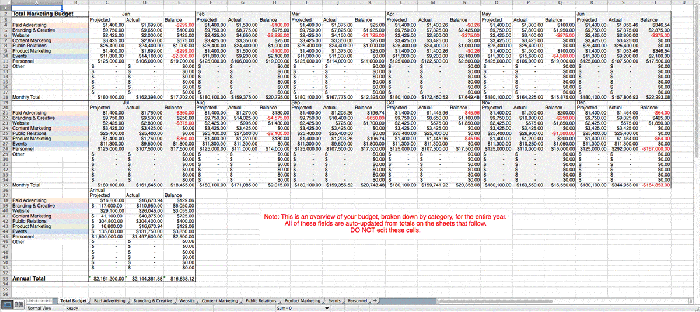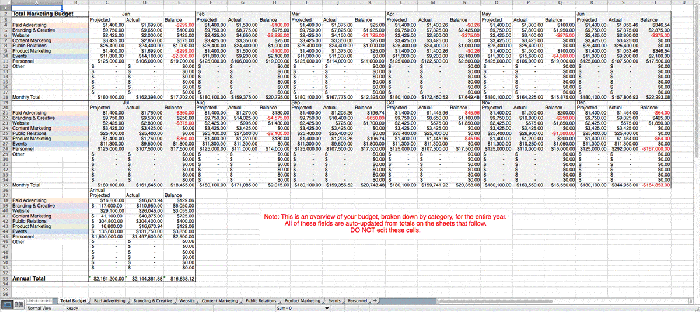Building a Marketing Budget is the cornerstone of any successful business venture, guiding the way to effectively allocate resources and drive growth. Dive into the world of strategic budgeting and unlock the secrets to marketing success.
Importance of Building a Marketing Budget
Having a well-defined marketing budget is crucial for businesses to effectively plan and execute their marketing strategies. It serves as a roadmap for allocating resources efficiently and maximizing the impact of marketing efforts.
Effective Resource Allocation
A marketing budget helps businesses allocate resources such as funds, time, and manpower strategically. By setting clear budgetary limits for various marketing activities, companies can prioritize initiatives that align with their goals and target audience. This ensures that resources are utilized in the most effective and efficient manner, leading to a higher return on investment.
Impact of Not Having a Structured Marketing Budget
Not having a structured marketing budget can have detrimental effects on a business’s growth and sustainability. Without a clear budget in place, companies may overspend on ineffective marketing tactics or miss out on opportunities to reach their target market. This lack of direction can result in wasted resources, inconsistent messaging, and ultimately, a loss of competitive edge in the market.
Factors to Consider When Creating a Marketing Budget: Building A Marketing Budget

When creating a marketing budget, there are several key factors that need to be taken into consideration to ensure its effectiveness in achieving business goals and objectives.
Market Research and Budget Allocation
Market research plays a crucial role in determining how the marketing budget should be allocated. By understanding the target audience, competition, and industry trends, businesses can make informed decisions on where to invest their marketing dollars. This helps in maximizing the impact of marketing efforts and ensuring a higher return on investment.
Alignment with Business Goals and Objectives
It is essential for the marketing budget to align with the overall business goals and objectives. By setting clear objectives and defining the desired outcomes, businesses can allocate resources effectively to support these goals. Whether the objective is to increase brand awareness, generate leads, or drive sales, the marketing budget should be tailored to achieve these specific objectives.
Strategies for Building an Effective Marketing Budget
Effective marketing budgeting requires careful planning and strategic decision-making to ensure optimal results for your business. Here are some key strategies to consider:
Setting Realistic Budget Goals
When setting your marketing budget, it’s essential to base your goals on historical data and industry benchmarks. Analyze past marketing campaigns to identify what has worked well and where improvements can be made. Set realistic goals that align with your overall business objectives to ensure your budget is well-spent.
Importance of Flexibility
Flexibility is crucial when it comes to adjusting your marketing budget based on performance metrics. Monitor the results of your campaigns closely and be prepared to reallocate funds to channels that are driving the most engagement and conversions. By staying agile and responsive, you can maximize the impact of your marketing budget.
Prioritizing Marketing Channels, Building a Marketing Budget
With budget constraints in mind, prioritize your marketing channels based on their effectiveness in reaching your target audience. Consider the preferences and habits of your ideal customers to determine which channels will provide the best return on investment. By focusing your resources on the most impactful channels, you can optimize your marketing budget for maximum results.
Tools and Resources for Managing a Marketing Budget

When it comes to managing a marketing budget effectively, having the right tools and resources can make a significant difference. Let’s explore some popular options that marketers can use to streamline their budgeting process.
Popular Budgeting Tools and Software
There are several budgeting tools and software available in the market that can help marketers track and manage their marketing expenses efficiently. Some popular options include:
- Excel or Google Sheets: These spreadsheet tools are versatile and customizable, allowing marketers to create detailed budgets and analyze expenses easily.
- QuickBooks: This accounting software can help marketers track expenses, generate reports, and manage budgets effectively.
- HubSpot: A marketing automation platform that offers budgeting tools to track campaign performance and ROI.
Benefits of Using Technology for Tracking Expenses
Utilizing technology for tracking and analyzing marketing expenses can provide several benefits, including:
- Real-time visibility into spending: Technology enables marketers to monitor expenses in real-time and make informed decisions to optimize budget allocation.
- Automation of processes: Software tools can automate budget tracking tasks, saving time and reducing the risk of errors.
- Data-driven insights: Technology allows for the collection of data that can be used to analyze trends, identify cost-saving opportunities, and improve overall budget efficiency.
Best Practices for Monitoring and Optimizing Marketing Spend
To ensure that marketing budgets are managed effectively and stay within limits, marketers should follow best practices such as:
- Regularly review and adjust budgets based on performance data and market changes.
- Set clear goals and KPIs to track the effectiveness of marketing initiatives and optimize spend accordingly.
- Collaborate with finance and other relevant teams to align budgeting strategies and ensure transparency in spending.
